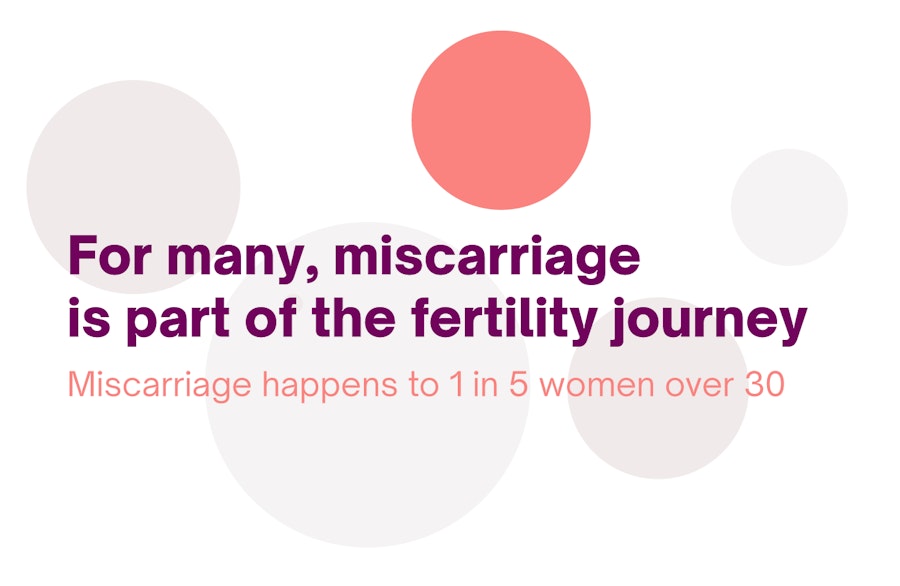What Causes Miscarriage?
What is miscarriage?
Miscarriage is the loss of an embryo or a fetus before a pregnancy reaches 20 weeks. This loss is more likely to occur during the first three months of pregnancy. Although it’s not often talked about, miscarriage is actually fairly common and is likely to affect many of us either directly or indirectly.
How many pregnancies end in miscarriage?
Whether it's the distress caused by pregnancy loss, or the stigma surrounding women’s reproductive health, miscarriage isn’t something we talk about openly. However, the reality is that pregnancy loss affects many of us and can have a number of causes.
There is a link between age and the frequency of pregnancy loss. In fact, for women under 30, 1 in 10 pregnancies will end in miscarriage, while women over 30 are twice as likely to experience pregnancy loss. Once a woman is over 45 years of age the likelihood of her experiencing increases to 5 out of 10 pregnancies ending in miscarriage.
It’s worth remembering that miscarriage can happen by chance and at any age. In fact, it’s possible miscarriage may be even more common than the numbers above suggest, since women who do not know they are pregnant might experience early miscarriage and mistake it for menstrual bleeding. If you already have irregular periods it may be more likely for miscarriage to go undiagnosed.
We know that many people feel grief and shock and a whole range of emotions after pregnancy loss, and this can make it a difficult thing to talk about. Every woman will want to process what’s happened differently. However, attending professional counseling, or speaking with friends and family can be a helpful part of the grieving process.
At Natural Cycles, we believe that there should be no such thing as stigma or an uncomfortable conversation when it comes to women’s health. Miscarriage affects so many of us and we want to acknowledge that it’s part of the fertility journey for many women and their partners.
Miscarriage causes
In most cases, miscarriage happens because there is a problem with the development of the fetus. There are many processes that have to happen in a baby’s development, sometimes these aren’t triggered, or there are abnormalities in them. Pregnancy loss is almost never caused by an action taken by the mother, things like exercise, sex, or minor injuries do not cause miscarriage.
In early pregnancy, miscarriage can be caused when a fertilized egg cell forms with an abnormal number of chromosomes (or genes). Unfortunately, there isn’t anything that can be done to predict or prevent this type of pregnancy loss. Problems with the development of the placenta (the organ linking the baby with the mother’s blood supply) can also cause miscarriage to happen in early pregnancy.
Certain conditions, like diabetes or hypothyroidism, can also increase the chances of miscarriage later in pregnancy, as can suffering from a serious infection or injury. Women with a weakened cervix may also be more susceptible to miscarriage, and there is some evidence to suggest that those with polycystic ovary syndrome (PCOS) may also be more likely to experience pregnancy loss, but the majority of women with these conditions do have healthy pregnancies.
Late miscarriage can occur after three months of pregnancy if there is an abnormality in the mother’s uterus. Women who have experienced two miscarriages in a row are also more likely to experience loss in future pregnancies, and they may be asked to carry out further tests by their doctor. However, many women do experience miscarriage and go on to carry on another pregnancy to full term.
Types of miscarriage
Miscarriage is categorized in several different ways. The types of miscarriage are:
Threatened miscarriage
Not all threatened miscarriage ends with pregnancy loss. Despite mild cramping and vaginal bleeding the cervix stays closed and in half of all cases, pregnancy will progress normally. The other half of cases progress to inevitable miscarriage, ending in pregnancy loss.
Inevitable miscarriage
In these cases, vaginal bleeding increases and the cervix opens. At this point the miscarriage becomes inevitable and the pregnancy is lost.
Incomplete miscarriage
Some tissue passes through the vagina, but some may be left inside the uterus. In these cases follow-up treatment may be needed to remove any remaining tissue.
Complete miscarriage
All of the tissue passes from the uterus through the vagina and no follow-up treatment is needed to remove the remaining tissue.
Missed miscarriage
There may be no immediate physical signs with a missed miscarriage. An ultrasound may be needed to confirm the pregnancy loss. In most cases, the tissue will pass on its own, but in some cases, treatment might be needed.
Miscarriage signs and symptoms
Common signs and symptoms of miscarriage are vaginal bleeding and cramping. If you are measuring your basal body temperature you may also notice a dip in temperature, which happens when there is a decrease in the hormone progesterone. This hormone is necessary for getting the body ready for pregnancy, as well as helping with the implantation of a fertilized egg cell in the uterus and aiding with the embryo's development in early pregnancy.
In many cases, miscarriage is not preventable, but if you experience any symptoms of miscarriage, or notice any abnormalities in either your menstrual cycle or your pregnancy, you should consult with a healthcare professional as soon as possible.
Tracking symptoms throughout your pregnancy
Keeping track of physical symptoms, as well as how you’re feeling emotionally, is a useful way to notice if anything changes on your fertility journey, whether you’re on birth control, trying for a baby or currently pregnant.
Natural Cycles is the first and only FDA cleared app that can be used to both prevent and plan pregnancy. It also has a follow mode, where you can keep track of your baby’s development and the changes that are happening in your body throughout your pregnancy.
Did you enjoy reading this article?
